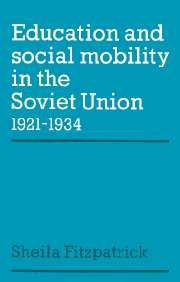7 - Cultural Revolution and the schools
Published online by Cambridge University Press: 11 November 2009
Summary
The new Commissar of Education for the RSFSR, Andrei Sergeevich Bubnov, was appointed on 12 September 1929. In terms of status within the party, Bubnov was a relatively high-level appointee for Narkompros. He was a member of both the Party Central Committee and the Orgburo, and had previously served as head of the Central Committee agitprop department and, for the past five years, the political administration (PUR) of the Red Army. He was regarded – in contrast to Lunacharsky – as a stern, no-nonsense administrator, and he was expected to introduce order and discipline into the commissariat.
This, however, was not Bubnov's only task in Narkompros. The old Narkompros leadership had been accused of ‘rightist’ and ‘bureaucratic’ tendencies, demonstrated above all by its lack of response to the new slogans of class warfare and Cultural Revolution. Bubnov had to show himself to be a true militant revolutionary on the cultural front, and this meant allying himself with the various radical groups which had been criticizing Lunacharsky's ‘bureaucratic conservatism’ over the past two years. But the radicals, unfortunately for Bubnov, had no interest at all in orderly and disciplined procedures.
The call for class-war Cultural Revolution came from above, but it aroused a genuinely enthusiastic response not only among young Communists but among all those with grievances against the ‘bourgeois’ cultural establishment. The response was iconoclastic, and often led to organizational chaos.
- Type
- Chapter
- Information
- Education and Social Mobility in the Soviet Union 1921–1934 , pp. 136 - 157Publisher: Cambridge University PressPrint publication year: 1979



